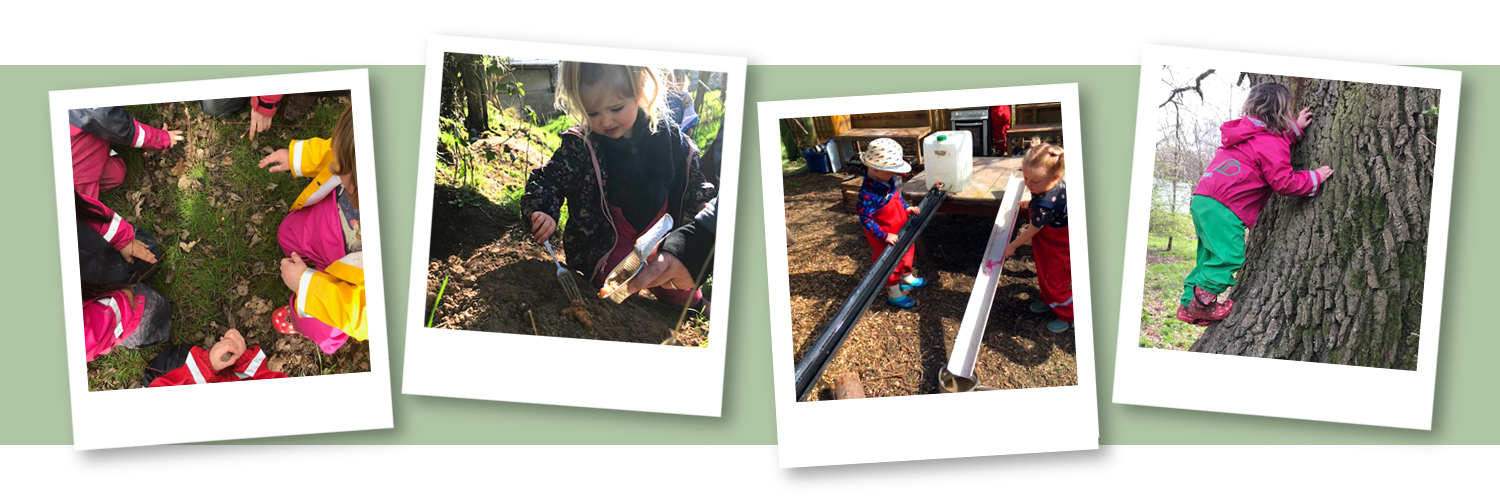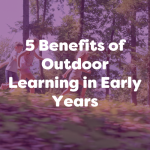
This article has been written by Rachel Macbeth-Webb. Rachel is a level 3 Forest trained practitioner, co-founder and manager of Beatle Woods, an Outstanding Ofsted setting and the first completely outdoor nursery in Solihull. In this post she shares her insights into Forest School and the importance of outdoor learning.
For more information about Rachel and Beatle Woods, visit their website.
What is Forest School?
Forest school refers to a long-term sustained approach to outdoor learning. It seeks to encourage children to be actively engaged with their outdoor environment and foster a positive relationship with nature. As practitioners, we absolutely MUST ensure children can flow to outside every day, regardless of the weather.
Forest School is been defined as:
“an inspirational process that offers ALL learners regular opportunities to achieve and develop confidence and self-esteem, through hands-on learning experiences in a local woodland or natural environment with trees. Forest School is a specialised approach that sits within and complements the wider context of outdoor and woodland learning.”
Forest School Association (FSA)
“getting children outside is vital, no matter how big or small the setting”
The Origins of Forest School
Most people are aware of the origins of Forest School and the subsequent movement to develop high-quality outdoor provision. There has been a plethora of Early Years Pioneers (both historical and modern), who have advocated the benefits for children spending time in nature. From the Macmillan sisters, Margaret and Rachel (founders of the Rachel Macmillan Open-Air Nursery), who were determined to improve conditions in schools, tackling issues of overcrowding and poverty, to the modern day pioneers like Professor Jan White, who have drawn on the Forest School Principles and evidence-based research to advocate for children to spend more time outside.
A Holistic Approach to Forest Schools
The holistic approach traditionally cascaded through Forest School training marries well with all aspects of early years practice, not only because the focus is on being outdoors, but because it encourages practitioners to think about their approach with individual children and how they might access learning.
We know that being outdoors is the optimum; the benefits are too many to mention; by combining the Forest School approach with a clear vision and pedagogical attitude ensures all children can not only enjoy the experience of being in nature but gain from its uniqueness.
What does this mean for Early Years?
Being outside is special, it is unlike any other experience. We feel the seasons and associated weather first hand; we feel the restorative and transformative impact of nature on our physical and emotional well-being.
Independent time spent outside means children have time to develop resilience, confidence, and independence.
We know that children need time to make sense of the world, where better than in the open air where there is an abundance of naturally occurring curiosities and a real sense of awe and wonder.
Adopting a Forest School approach
“Enabling”
A key message in any Forest School training is that of collaboration. Having the opportunity to build friendships, rely on others and develop trusted relationships is clearly fundamental to good early year’s experiences. As practitioners, we are in the unique position to ‘enable’ and provide the right conditions for this to happen. Within the EYFS and key person role, we carefully gather information and get to know the children and their families well, because this provides an invaluable insight into each child and their uniqueness.
Engaging
We cannot and should not try to replicate classroom experiences in the great outdoors. Being outside is different; we enable others to immerse themselves in everything nature offers. The focus is not on the ‘activities’ we can provide, or what we can ‘do’ outside; we afford children opportunities to engage, and unrushed time outdoors with skilled facilitators who use their knowledge of each child to support them on their journey.
Observing
Being outside, without generic toys (which absolutely do have a place in childhood), children are free to use and grow their imaginations using the props afforded by nature. Free from the confines of prescriptive resources there is a palpable change when children use whatever occurs in nature to support and drive their own play. There is no need for adults to interfere and in fact the best play occurs without us. Watching, waiting, and observing children is so important and vital to developing these respectful relationships.
Empowering
Once we begin to build trust with the children and a partnership with parents, we are then able to empower children whilst respecting their voices and choices. This has a phenomenal impact as children quickly develop a real sense of agency and belonging. The space is theirs, not ours and they use this as they choose not as we might determine. Children quickly learn to manage risk for themselves and their friends; we often hear children warning one another about stinging nettles or trip hazards – of which there are plenty in our 10 acre site.
Key messages to take away
- Don’t overthink – leave the planning behind
- Keep the space uncluttered – children don’t need toys outside
- Dress appropriately – rain is not a barrier
- Time – make sure you have time, unrushed and uninterrupted
- Confidence – embrace what is on offer and wait to see what happens!
Lastly, just get out there and enjoy! You will soon see the massive benefits for all




